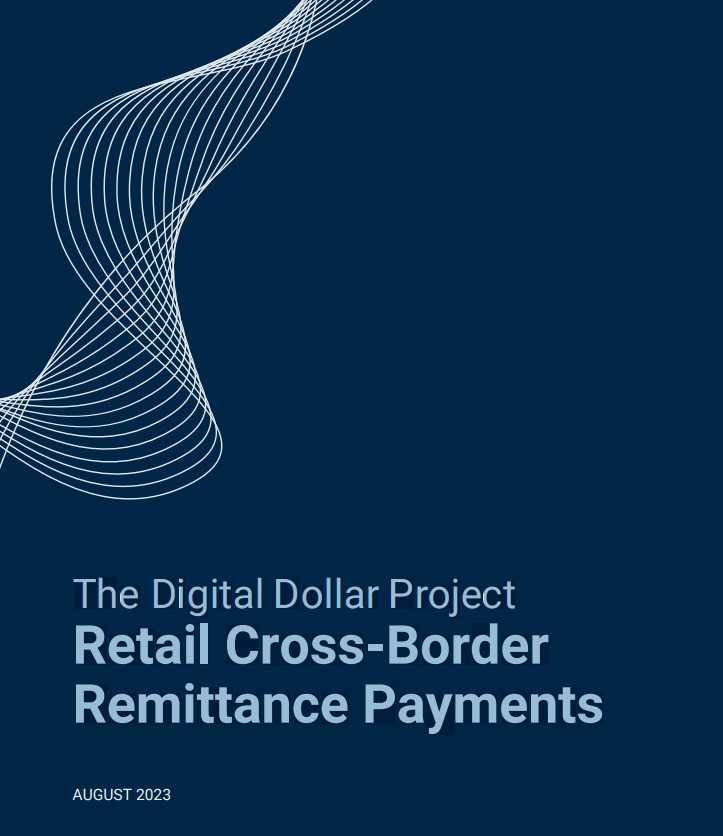Last week, the Digital Dollar Project published the findings of our first retail CBDC pilot study, "Retail Cross-Border Remittance Payments." This paper delves into the potential of a CBDC to alleviate the challenges faced by customers sending remittances worldwide. In today's global landscape, these transactions serve as a lifeline for countless individuals worldwide, playing a pivotal role in both the domestic and global economy. However, these transactions are marred by a range of complexities, including multi-party risk, limited interoperability, and a lack of transaction transparency. Out of the $626 billion in remittance payments in 2022 to low- and middle-income countries, approximately $37 billion was consumed by fees. But what if we could overcome these hurdles? In collaboration with Western Union and BDO Unibank, The Digital Dollar Project, along with Accenture, explored this very question. Together, we undertook a pilot study to explore whether a simulated retail U.S. CBDC could enhance remittance processes in the bustling U.S.-Philippines corridor, which ranks among the busiest corridors on a global scale. Our research revealed that CBDCs may improve remittance processing by settling a peer-to-peer payment in less than ten seconds, a significant improvement over most settlement mechanisms. A key driver behind this was atomic settlement, which reduced counterparty risk and optimized liquidity via streamlined foreign exchange spot orders and multi-party settlement. Importantly, rather than displacing existing financial institutions, CBDCs offer a chance to modernize operational processes and expand access, making financial systems more inclusive and efficient. To read more about the pilot study's architecture and additional findings, check out the full report ➡ "Retail Cross-Border Remittance Payments," Special thanks to our partners Kevin Mole, Patrick Schumacher, Geneva Gloria, Ferdinand Bacungan, David Treat, Cam Nili, Dominic Paolino, Nawar Basha, and Digital Dollar Project fellow, Kristy Lam. If you are interested in a Digital Dollar Project fellowship, email [email protected] for more information. For the listeners out there, check out Digital Dollar Project's latest conversation, "CBDCs & Privacy: Considerations for an International Landscape". In this webinar, we explored CBDC implications for cross-border payments, the alignment with the protection of fundamental human rights, and the challenges posed by cross-jurisdictional interoperability. |
Global CBDC MovementIf you'd like to be updated with CBDC happenings in real-time, follow us on LinkedIn and Twitter!Russian President Vladimir Putin has signed the digital ruble bill into law. According to this law, the Russian central bank will be the principal operator of the digital ruble infrastructure and will be responsible for the stored assets. The central bank has been granted the authority to launch the first CBDC pilot with real consumers this month. The Banque de France (BdF) has published a second report with 4 key policies and 4 key technical takeaways on its 12 distributed ledger technology (DLT)-based wCBDC experiments. Among these findings, the BdF emphasized that interoperability should be prioritized for seamless exchanges between DLT-based and conventional infrastructures and that DLT could enhance straight-through processing and contribute to overall financial stability. The Bank of Japan (BoJ) held the inaugural meeting of its CBDC Forum--which comprises 60 enterprises encompassing banking, payment services, retail, information technology, and fintech, aiming to leverage private sector expertise for its pilot program. Two working groups were formed following the Forum to discuss the CBDC system connection with external systems and overlay services. The Central Bank of Nigeria will upgrade the eNaira to include near-field communication (NFC) functionality. NFC stickers have been developed that could be attached to any phone to facilitate contactless payments. China's e-CNY has reached over $250 billion in transaction volume, according to the People's Bank of China governor Yi Gang. With around 950 million transactions on 120 million wallets since the January 2022 rollout, the average transaction amount is approximately $260. South Korea has chosen Jeju, Busan, and Incheon as the three regions for its CBDC pilot. These pilots would be closed regional tests, where a CBDC wallet app would allow locals and tourists to participate. The Bank of Korea also provided an update on its efforts in CBDC research as part of its 2022 Payment and Settlement Systems Report. Research areas have included NFC, smart contracts, and ZKPs. |
Top Shelf ReadingsParallelized Architecture for Scalably Executing Smart Contracts (PArSEC) The MIT Digital Currency Initiative introduced an open-source platform with a flexible technical architecture that supports centralized digital currency at scale. The platform facilitates smart contract execution, allowing clients to easily update their contracts' logic and supporting many different smart contract environments running simultaneously. Central Bank Digital Currency and Financial Stability A paper authored by Ahnert, Hoffman, Leonello, and Porcellacchia examines the effects of a renumerated CBDC on bank fragility. The authors find that to an extent, an increase in CBDC renumeration can lead to an increase in financial stability because it increases competition for banks to offer more attractive deposit rates. The authors also highlight the positive redistributive effects a renumerated CBDC could have by accruing greater benefits to depositors rather than banks. |











 All while Pfizer—a company with a $2.3 billion criminal fine for fraudulent marketing, bribery, and kickbacks—was given blanket immunity from liability and billions in taxpayer dollars to produce a vaccine in record time with no long-term safety data.
All while Pfizer—a company with a $2.3 billion criminal fine for fraudulent marketing, bribery, and kickbacks—was given blanket immunity from liability and billions in taxpayer dollars to produce a vaccine in record time with no long-term safety data.
























